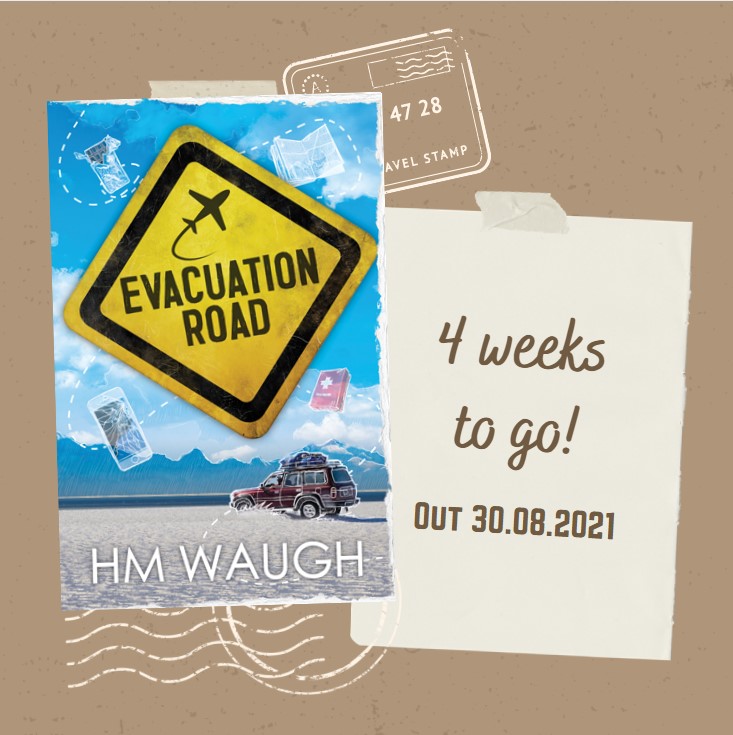In four weeks my next book ‘Evacuation Road’ will be out in the world, and that calls for a super celebration countdown! So every week I’ll be bringing you some of the actual events that inspired some of the story.

Let’s start it off with a bang. One of the big mantras that Eva and my other characters learn to live by as they race for the last flight home, is “Stick together”.
It’s something I learned the hard way. How? Glad you asked …
Getting kidnapped is not recommended
I don’t think anybody is out there just aching to be kidnapped (though thinking about this has me coming up with some great story ideas!). And I was no different.
Let’s set the scene. I was 21 years old, in La Paz in Bolivia, high up in the middle of South America. The altitude was about 3,600 m above sea level, something I’d become happily acclimatised to. Until, that is, I spent almost three weeks down in the Amazon Basin.
On the day of my sorry tale, I’d just flown back. That meant maybe 3,500 m of altitude increase in a couple of hours. Not something I’d wanted to do, because I knew the change would hit me. But the road back up was blockaded, so it was fly or nothing.
The backpacker I’d been travelling with was about to head home and needed to rebook his return flight. We walked to a travel agent together, but the booking process was tedious and I was So Tired. Plus, I hadn’t come to La Paz to be bored in a travel agent, had I?
So I left him there and went to sit in a sunny park and watch the world go by. It was glorious.
When a local sat next to me, I didn’t think anything of it.
When the police came asking to check passports, I was halfway to thinking No bloody way when the guy next to me produced his. Oh, so no worries then, my sluggish brain decided, not even managing to wonder why a local would carry their passport around. I pulled mine out of my money belt and handed it to the “police”.
They weren’t happy. I didn’t have the right stamps to be in the country. Except I knew I did because I’d just renewed my visa. And it had been hard and time-consuming and expensive, and I didn’t want to lose that visa … even though getting kidnapped is harder and more time-consuming and potentially way more expensive Heather you idiot. That’s what I should have said to myself anyway. I didn’t.
Instead I let myself be put into a car with two police officers who weren’t police officers and the guy who’d been sitting next to me who wasn’t an innocent local. Note to everyone reading: Don’t do this. Ever.
Seriously, I mean it. Don’t get into cars with dangerous strangers.
As soon as I was in their car, I knew I was in trouble. My brain clunked into gear, my body went on high alert, blood being diverted to my head to try and think straight. What could I do? I had no mobile phone, no way to alert my friend. Plus, I’d just cashed in a traveller’s cheque so I had hundreds of US dollars in my money belt just waiting to be stolen.
You know, the money belt they knew I had because I’d taken my passport out of it. Right in front of them.

I did my first smart thing in a while. While the men were arguing about which way to drive to get out of the city, I reached into my still-unzipped money belt and took out the vast majority of my money, leaving a few notes behind. Because these men had put a lot of effort into getting me, and I didn’t want them angry or thinking they hadn’t got enough out of the whole thing. I shoved the big wad of notes into my sock and pulled my pants leg back over it.
Just in time. The man next to me started searching me, patting me down, pulling at my money belt. I managed to hide my bank card in the folds of the belt but he grabbed all my remaining cash and all of my traveller’s cheques.
And all the while, all I could think of was Don’t make them angry. So I smiled and I pretended I had no idea they were robbing me, and I chatted to them in my poor Spanish about cultural differences between Bolivian and Australian weddings. I know, it sounds random, but we’d passed a wedding procession as they were whisking me out of the city and it’s all I could think of to talk about.
The day was chilling down when they finally slowed the car. Finally gave me back my passport. Finally stopped in some scary edge-of-nowhere road and let me go. I was shaking so hard and my brain was so sapped I couldn’t remember how to ask for help. I eventually made my way back to the city, back to my friend, barely comprehending that I was free and unhurt.
And you know what? He was still embroiled in trying to change his flight booking and had no idea I’d been through a Serious Incident. But you know what else? It would have been way better to have stayed with him, bored, than be stuck in that car with those men.
So, yes, I’m now a believer in sticking together, and I made my characters have that same sort of realisation in the book 🙂 .
Want to learn more? Tune in next week, and keep your eyes out for ‘Evacuation Road’, out 30 August at all good bookstores!
Love this incredible story so much – we’re lucky to have you!
LikeLiked by 1 person